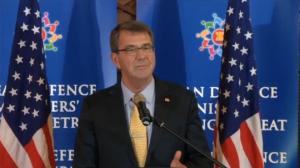
(Reuters) — U.S. Defense Secretary Ash Carter on Wednesday (November 4) defended U.S. naval presence in the South China Sea, and said the inability of ASEAN defense ministers to reach a consensus reflected their concern about China’s activity in the area.
Disagreement between the United States and China over how to address rival claims in the South China Sea marred a gathering of Southeast Asian defence officials on Wednesday, with a joint statement scrapped after ministers failed to agree on its wording.
The United States and its allies had pressed for a mention of disputes in the South China Sea in the statement while a senior U.S. defence official said China had lobbied members of ASEAN to avoid any reference.
The meeting came just a week after a U.S. warship challenged territorial limits around one of China’s man-made islands in the Spratly archipelago with a so-called freedom-of-navigation patrol.
The patrol prompted China’s naval chief to warn his U.S. counterpart that a minor incident could spark war if the United States did not stop “provocative acts”.
Carter on Wednesday defended the move, pointing the finger at China’s recent activities in the area.
“Well let me just remind you that the presence of U.S. naval vessels in the South China Sea is not new, that’s been going on for decades. What’s new is dredging, and reclamation, and militarization – that’s what’s new this year, is the scale of reclamation and militarization. U.S. operations, naval operations, in the South China Sea is not new,” said Carter.
China claims most of the South China Sea, through which more than $5 trillion in global trade passes every year. Vietnam, Malaysia, Brunei, the Philippines and Taiwan have rival claims. It also objects to what it sees as outside interference in the disputes.
The United States says it takes no position on the claims but it and allies such as the Philippines have been alarmed by increasingly assertive Chinese action including island-building on disputed reefs.
The forum on Wednesday included defense ministers from the 10 ASEAN members and counterparts from countries such as the Australia, China, India, Japan and the United States.
Carter said the inability of the Southeast Asian ministers to agree on a statement reflected their concern about China’s activity in the sea.
“I had no expectation that everyone would agree on the South China Sea or any other issue. That’s the reason for this forum is to discuss these issues, so I had no expectation with the agreement there. With respect to the joint statement, that is something that ASEAN members discuss. Obviously they weren’t able to reach consensus, and that reflects I think the level of concern that was reflected in the conversation about activities in the South China Sea,” he said.
Carter and Malaysian Minister of Defense Hishammuddin Hussein are due to cruise on the USS Theodore Roosevelt on Thursday (November 5), a U.S. defense official said, for a voyage bound to keep tension over the rival claims in the spotlight.
“The Teddy Roosevelt’s presence there and our visit is a symbol of our commitment to a rebalance and the importance of the Asia Pacific to the United States,” Carter said.
There was no information about where the U.S. warship would sail but it has been on patrol in the South China Sea. On Wednesday, China‘s defence minister Chang Wanquan said freedom of navigation should not be “hyped up” or used as an excuse for provocation.
The ministers’ meeting, first held in 2006, is a platform to promote regional peace and stability.
Leaders of the countries attending meet again at ASEAN and East Asia summits this month and Hishammuddin said on Wednesday that those talks would give more opportunities to resolve differences.







